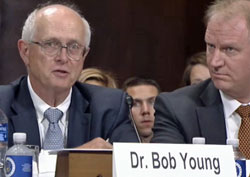 At a Senate Judiciary Committee hearing Tuesday on “Consolidation and Competition in the U.S. Seed and Agrochemical Industry,” executives of DuPont, Dow AgroSciences, Syngenta, Bayer and Monsanto defended the current spate of mergers and acquisitions as being important to continue to deliver on the innovation that farmers need to feed a growing global population, while agricultural organizations urged caution.
At a Senate Judiciary Committee hearing Tuesday on “Consolidation and Competition in the U.S. Seed and Agrochemical Industry,” executives of DuPont, Dow AgroSciences, Syngenta, Bayer and Monsanto defended the current spate of mergers and acquisitions as being important to continue to deliver on the innovation that farmers need to feed a growing global population, while agricultural organizations urged caution.
Bayer CropScience President and CEO Jim Blome and Dr. Robb Fraley of Monsanto talked about the deal between the two companies announced last week. “This transaction brings together creative minds from two complementary segments of the industry to address the challenges farmers face today and in the future,” said Blome.
Fraley contends that competition will actually increase under the mergers proposed. “Innovation drives competition. Innovation strengthens the farming economy. And innovation lifts our society and improves the environment,” he said.
Also speaking at the hearing were James Collins, DuPont Executive Vice President, Agriculture Division; Tim Hassinger, President & CEO Dow AgroSciences; and Mr. Erik Fyrwald, Chief Executive Officer, Syngenta International AG. [wpaudio url=”http://traffic.libsyn.com/zimmcomm/hearing-agribusiness.mp3″ text=”Judiciary Committee Hearing Agribusiness Company Statements”]
Representatives from the American Farm Bureau Federation, National Corn Growers Association, and National Farmers Union also had their say on the consolidations announced this year which are poised to cut the number of major companies in the seeds, chemicals and crop nutrients market in half.
 AFBF Chief Economist Dr. Bob Young told the committee that farmers and ranchers cannot afford to lose access to technology and innovation through consolidation. “AFBF has had several—and repeated—assurances from the companies involved as to their intent to maintain as strong an innovation arm as they can,” Young said. “We have no reason to doubt, but we also are reminded of the old line: trust, but verify.”
AFBF Chief Economist Dr. Bob Young told the committee that farmers and ranchers cannot afford to lose access to technology and innovation through consolidation. “AFBF has had several—and repeated—assurances from the companies involved as to their intent to maintain as strong an innovation arm as they can,” Young said. “We have no reason to doubt, but we also are reminded of the old line: trust, but verify.”
Speaking on behalf of both corn growers and the American Soybean Association, NCGA CEO Chris Novak told the committee that consolidation in the industry is being driven in part by the regulatory climate. “The process of developing and testing new products, and then securing regulatory approval to bring them to market, requires a substantial amount of time and money. As a result, fewer and fewer companies have the resources to be players in the market. This trend toward consolidation will continue unless and until Congress addresses these regulatory hurdles,” Novak testified.
NFU president Roger Johnson asked the panel for more oversight of antitrust enforcement in agriculture. “The hands-off approach we’ve seen in antitrust enforcement has led to the highly consolidated economic conditions prevalent today and the resulting vulnerability of American farmers. We must do more to prevent consolidation that results in a few firms controlling substantial percentage of market share,” Johnson said.
Listen to the opening statements of all three agriculture group representatives here: [wpaudio url=”http://traffic.libsyn.com/zimmcomm/hearing-ag-groups.mp3″ text=”Judiciary Committee Hearing Ag Group Statements”]















